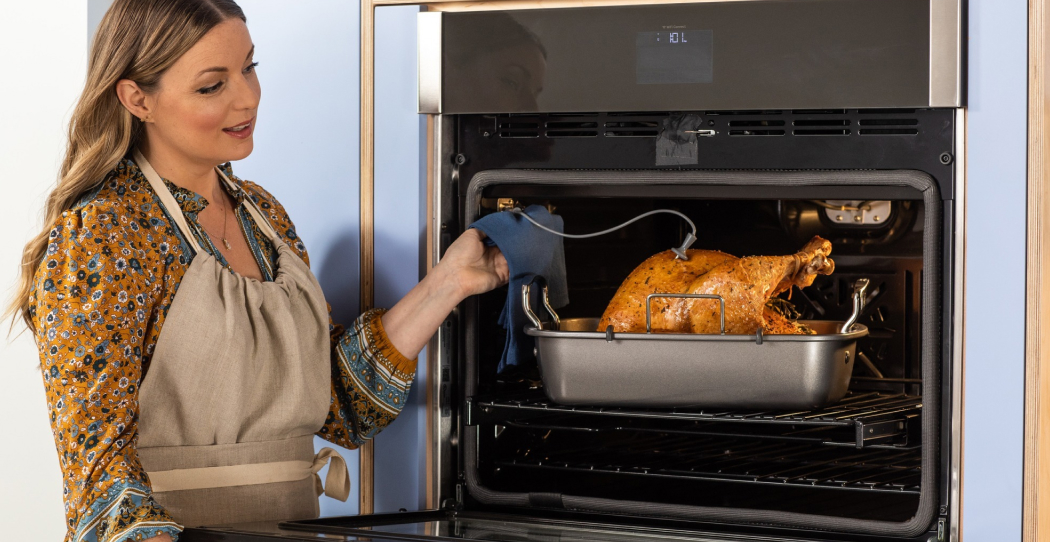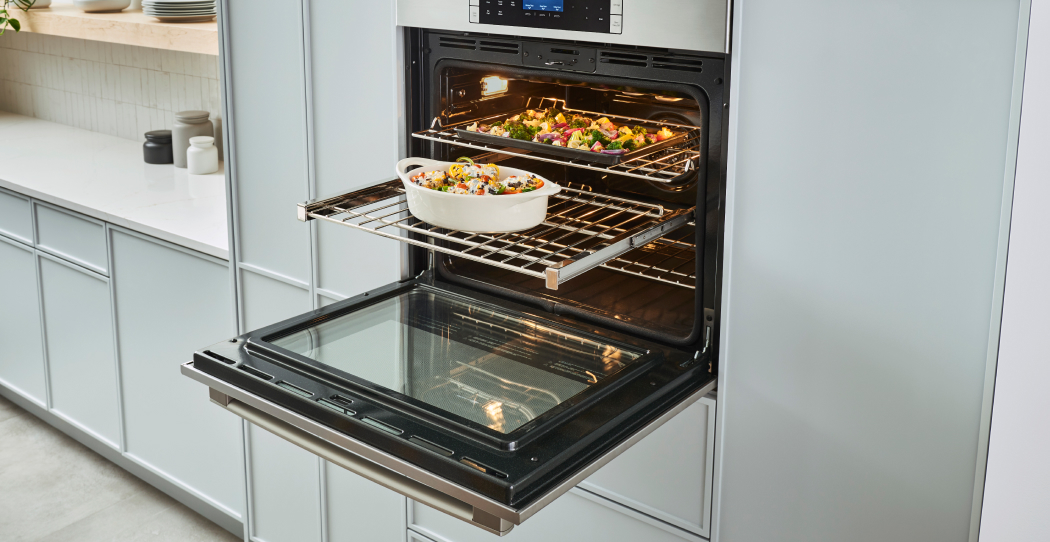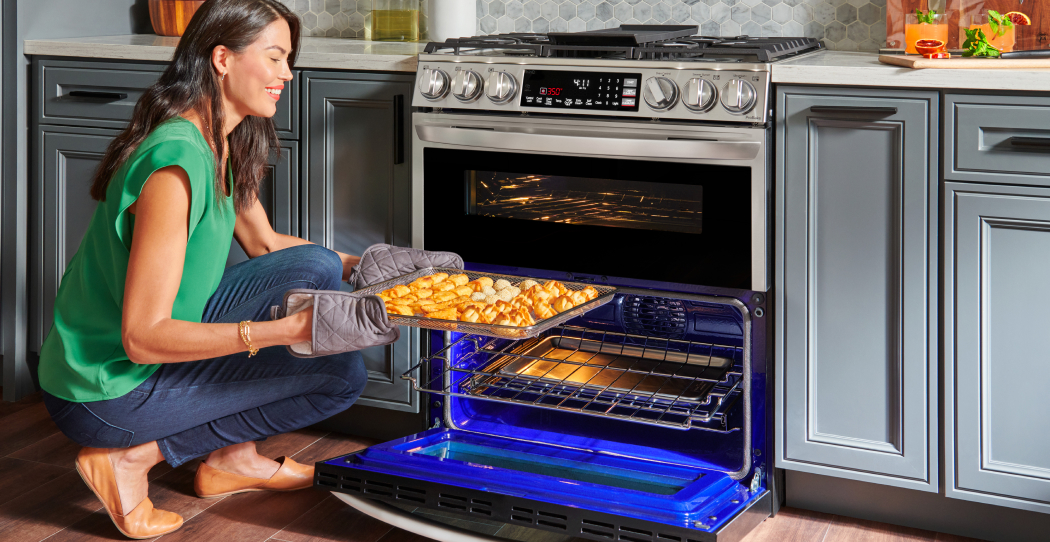Maintaining your oven's optimal performance and durability is essential for positive cooking experiences. Regular maintenance of your oven promotes longevity and contributes to the quality and safety of your cooking experience. Not maintaining your oven properly can lead to multiple issues, including decreased efficiency, unpleasant odors, and even safety hazards such as fire risks. Here, at Woodcocks, our team of appliance experts is excited to share some tips on how to ensure your oven stays in optimal condition. Let’s get started!

Cleaning Your Oven Regularly
While it may seem like a basic step, cleaning your oven after each cooking session is essential. Use a damp cloth or sponge to wipe the interior and exterior of your oven while it's still slightly warm, but not hot! This helps remove food residues and spills before they harden.
If needed, remove the trays and racks for better cleaning. Use water and soap to remove grease from the racks. For the interior, consider using an oven cleaner or a mixture of baking soda and water. Avoid harsh chemical cleaners that could damage surfaces or leave behind toxic residues.
Self-Cleaning Ovens
Many modern ovens have a self-cleaning feature that uses high temperatures to burn off food residues and spills. When using the self-cleaning mode, ensure that your kitchen is well-ventilated to allow for the release of smoke.
Be aware that this feature uses extremely high temperatures, which can shorten the lifespan of your oven. We advise all users to use this feature sparingly and make sure to familiarize themselves with it. Don’t forget to follow the manufacturer's instructions for safe and effective use.
Checking Door Gaskets
Gaskets are responsible for ensuring that heat remains trapped inside. Over time, the gasket may wear out or develop tears, leading to decreased performance. To ensure optimal functionality, regularly inspect your oven door gaskets for signs of damage such as cracks or detachment. If any issues are detected, replace the gaskets to ensure heat retention and prevent energy waste.
Maintaining the Oven Blower
The blower motor in your oven is one of its most important features. Not all oven blowers require lubrication, but models with sleeve-bearing motors do. Consult your oven's manual to see if lubrication is recommended for your specific model. If your oven has a ball-bearing motor, pre-lubrication has already been done at the factory.
To lubricate the sleeve-bearing motor, apply a suitable oil at the back and front of the motor, ensuring it reaches any hidden ports inside the housing. This process can help prevent premature damage as dirt and debris inside the blower motor will not continue to build up.
Proper Ventilation
Another important factor to consider is where you place your oven. Always ensure the vents around your oven are clear of obstruction, allowing sufficient airflow around the blower motor. When putting things inside the oven, make sure that the oven’s inlets and outlets are not restricted. This helps prevent early element failure or encourage poor performance.
Additionally, you must clean the vents of your oven to prevent the buildup of grease and debris. Use a vacuum or a brush to remove dust and dirt from the vents. Do this gently to avoid damaging any components

Check Heating Elements
Heating elements that have burned out can lead to a decrease in oven power. If you notice a drop in performance, it's essential to inspect the heating elements. One method is to check the resistance of each heating element using a digital multimeter. Before conducting this test, ensure to switch off the power to the oven for safety.
Another approach is to use an ammeter to measure the amperage. If the current is found to be 10 percent lower than expected, it indicates a potential issue with individual heating elements.
Using the Correct Power for Your Oven
Operating your oven on reduced power can lead to poor performance. To prevent this issue, it's essential to ensure that the power supply is correct. Consider using a buck-boost transformer to correct the supply and maintain optimal performance.
Checking Oven Thermocouples
If your oven has shut off unexpectedly, it may be due to a sensor break. Check for any broken or open thermocouples, as well as any potentially shorted leads. While less common, shorted leads can also occur outside of the oven and may affect its functionality.
Give Your Oven the Care It Deserves
Maintaining your oven is vital for its longevity, efficiency, and safety. By following these tips, you can keep your oven in optimal condition and extend its longevity. For more expert advice on appliance maintenance, visit our blog page or contact our team of professionals.
If you are looking for a replacement, make sure to explore the best ovens for sale at Woodcocks Appliance or visit our appliance store location in Miami, FL. We offer a great selection of ovens, including single electric ovens, double electric ovens, gas ovens, ovens with microwaves, warming drawers, and more!

Related Readings:
Frequently Asked Questions: Oven Maintenance Tips
Do ovens need servicing?
Ovens benefit from regular servicing to maintain their performance and safety. Maintenance tasks such as regular cleaning, checking for wear and tear, and ensuring proper ventilation can help prevent issues and extend the lifespan of your oven.
How to clean an oven?
To clean an oven, start by wiping down the interior and exterior surfaces with a damp cloth or sponge after each use. For deeper cleaning, remove your oven racks and trays and wash them with water and soap. Use an oven cleaner or a mixture of baking soda and water for stubborn stains on the interior surfaces. Remember to avoid harsh chemicals that could damage the oven.
When should I get a new oven?
You should consider getting a new oven if your current one experiences frequent breakdowns, has major performance issues, or is outdated and inefficient. Additionally, if repairs become too costly, it may be time to invest in a new one.
How long do ovens typically last?
Ovens typically last around 10 to 15 years with proper maintenance and care. However, the lifespan can vary depending on factors such as usage, quality of construction, and how well it's maintained.





